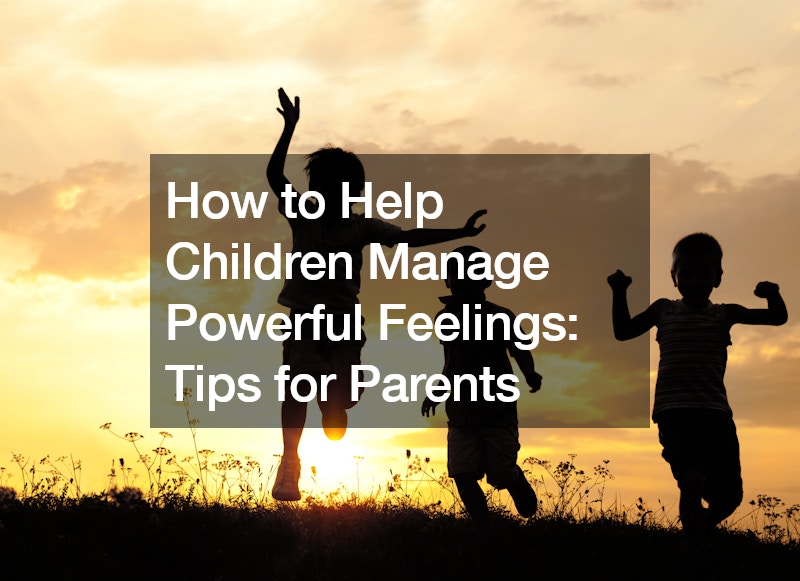How to Help Children Manage Powerful Feelings Tips for Parents


In today’s fast-paced world, children often experience a whirlwind of emotions that can be overwhelming for them and challenging for parents to navigate. From tantrums to defiance, understanding how to help children manage their powerful feelings is crucial for their emotional well-being. In this guide, we’ll explore practical tips and strategies that parents can use to support their children in handling big emotions effectively.
Understanding Emotional Development
Before diving into the strategies, it’s essential to grasp the basics of emotional development in children. Emotions are a natural part of human experience, and children, just like adults, need guidance in managing them.
Children’s brains are still developing, and they may struggle to regulate their emotions, especially when they feel upset, frustrated, or overwhelmed.
Empathy and Validation
One of the most powerful tools parents have in supporting their children’s emotional development is empathy and validation. When children express their feelings, it’s essential for parents to listen attentively, without judgment, and validate their emotions. Validation means acknowledging and accepting what children are feeling, even if you don’t agree with their behavior.
For example, if your child is upset because they didn’t get their favorite toy at the day care center, you can say, “I understand that you’re disappointed. It’s okay to feel sad when things don’t go the way you want them to.”
Modeling Emotional Regulation
Parents play a crucial role in modeling healthy emotional regulation for their children. By demonstrating how to cope with stress, frustration, or anger in constructive ways, parents can teach children valuable skills for managing their emotions. Simple techniques like taking deep breaths, counting to ten, or using positive self-talk can be effective tools for both parents and children.
Creating a Safe and Supportive Environment
Children need to feel safe and supported when expressing their feelings. Parents can create a nurturing environment where children feel comfortable sharing their emotions without fear of judgment or punishment. Encourage open communication, and let your child know that it’s okay to talk about how they feel, even if it’s difficult.
Setting Clear Expectations
Setting clear expectations and boundaries can help prevent meltdowns and tantrums in children. When children know what is expected of them and understand the consequences of their actions, they are more likely to regulate their behavior effectively. Be consistent with your rules and routines, and provide gentle reminders when necessary.
Teaching Coping Skills
Teaching children coping skills is essential for helping them manage powerful feelings. Encourage your child to identify their emotions and express them in healthy ways. Offer alternatives to negative behaviors, such as drawing, journaling, or engaging in physical activities like running or jumping. By giving children constructive outlets for their emotions, parents can help them develop resilience and emotional intelligence.
Positive Reinforcement
Positive reinforcement involves acknowledging and rewarding desirable behavior in children, which can be a highly effective method for fostering positive habits and emotional regulation. By praising children when they demonstrate appropriate emotional responses or effectively utilize coping skills, parents can reinforce these behaviors and encourage their repetition. This form of encouragement can take various forms, from verbal affirmations such as “You did a great job calming down” or “I’m proud of how you handled that situation” to tangible rewards like stickers or extra playtime.
Furthermore, positive reinforcement not only boosts children’s confidence but also strengthens the neural pathways associated with desirable behaviors, making them more likely to recur in the future. By consistently acknowledging and celebrating their achievements, parents can help instill a sense of self-efficacy and resilience in their children, empowering them to navigate challenging situations more effectively.
Seeking Professional Help if Needed
Seeking professional help is essential if a child’s emotional struggles persist or significantly interfere with their daily functioning. In such cases, consulting a child psychologist or therapist can provide valuable support and guidance tailored to the child’s individual needs. These professionals are equipped with the expertise to assess and address a wide range of emotional and behavioral issues, offering strategies and interventions to help children cope and thrive.
It’s important for parents to recognize that seeking professional help is not a sign of weakness but rather a proactive step toward ensuring their child’s well-being. By accessing the appropriate resources and support services, parents can gain valuable insights into their child’s emotional needs and learn effective strategies for managing challenging emotions. Remember, you’re not alone in this journey, and there are dedicated professionals ready to assist you and your child every step of the way.
Conclusion
Helping children manage powerful feelings is a journey that requires patience, understanding, and commitment from parents. By practicing empathy, modeling healthy emotional regulation, and creating a supportive environment, parents can empower their children to navigate life’s ups and downs with confidence and resilience. With love, patience, and the right tools, parents can help their children thrive emotionally and socially.
.








